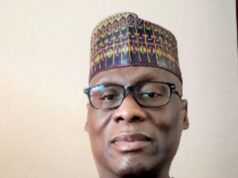
To be sure, hijab is a head covering worn by Muslim women in observance of the Islamic religion. It is a scarf that covers the hair and neck and is a symbol of modesty.
The contemporary understanding of the hijab dates back to Hadith when the “verse of the hijab” descended upon the community in 627 CE. It is documented in the Holy Qur’an, Sura (verse) 33:53, stating: “And when you ask (his wives) for something, ask them from behind a partition. That is purer for your hearts and their hearts.”
As a matter of fact, the primary intention of the Hijab is to protect women from evil eyes. And referring to this, Allah says: “O Prophet, tell your wives and your daughters and the women of the believers to bring down over themselves of their outer garments. That is more suitable that they will be known and not be abused.”
Now, the general essence of the hijab is to make women and girls in Islam as special breed in many ramifications: dressing, attitudinal displays, inter-relationships with others and in the society and so on.
It encompasses morals and good upbringing of the female gender, in consonance with ideals expected of pious women in Islam.
Hijab had recently became a trend in some communities across the world, in which the longer the veil (hijab) the more pious and morally right the wearers are regarded.
And, the recent developments in Nigeria as regard the issues of corruption and the fight against it have left sore taste in the mouth, against the hijab sisters.
The controversies about fraud and misappropriation of funds at the Federal Ministry of Humanitarian affairs in recent time casted a shadow over what an ideal “hijab sister” should be.
What have been trending are issues of the former minister in charge of the said Ministry, Hajiya Sadiyya Umar Farouq, a hijab sister; former Head of the National Social Investment Programme, Halima Shehu, another hijab sister and Dr. Betti Edu, who until her suspension over alleged financial mishaps, also a “hijab” sister” (as she used to sometimes wear hijab, all run against the essence of the hijab concept.
Though Dr. Edu is Christian, she has often conformed with the Islamic ways of dressing, using hijab whenever she is on assignment to areas predominantly Muslims.
The dressing styles of these women and the conduct in public reflected the true essence and practice of Islam, and truly caught the admiration of many of us who are Muslims.
But the matter concerning them that are however, still under investigations, have left many of their admirers worrying. The worries are not just about the other sides of them, true or false, that are emerging, but also about the new public perception of where they belong and what they claim to represent in the religious realm.
This write up, of course, is not about whether certain money is missing or not , nor whether one person is indicted or not, rather, it is about the “morals” attached to the wearing of hijabs with which they have been identified vis a vis the new image that is threatening to obliterate the morals they have built, which also directly or indirectly link to the much talk about gender equality or the call for 30% affirmative action for women in government circle.
Rashidat Yusuf writes from Abuja.
Yusufrashidat12@gmail.com






